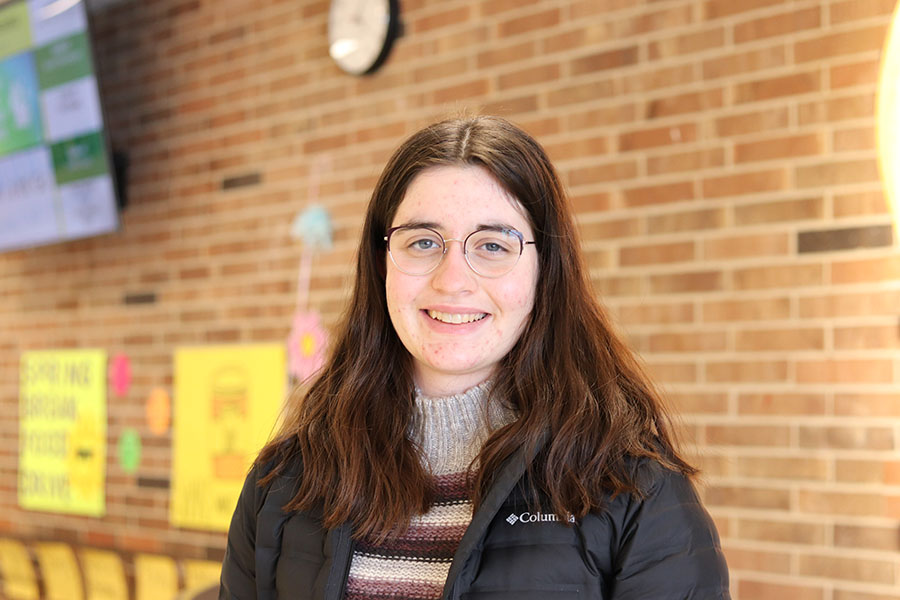The gifted-kid burnout phenomenon
Once a student is deemed “gifted,” the heavy expectations of the label can cause what’s increasingly known as “gifted-kid burnout.”
Junior Clare Loussaert poses in the West High commons.
Within a student’s school life, they may be accepted into a program for “gifted and talented” students. Beginning in elementary school, a student in the program learns at an accelerated pace, usually in programs such as ICCSD’s Extended Learning Program (ELP).
When they get to high school, students who were placed in the program may be more likely to choose more challenging classes such as honors or Advanced Placement classes. By the time they reach these classes, they can be confronted with difficulties they haven’t experienced before.
These challenges can lead to what is called “gifted-kid burnout.” Coined on social media, gifted-kid burnout is a phenomenon where once-gifted students lose motivation and start to struggle with school. Students who weren’t challenged previously are not likely to have developed a good work ethic earlier in life, depending on their natural intelligence to get them through tests and assignments.
Taking on difficult classes or classes with large workloads is also a contributing factor to burnout. Students who started in the gifted program may feel pressured to continue taking advanced classes. As the classes become more time-consuming and increasingly difficult, students become overwhelmed and can lose motivation.
One of these students is Clare Loussaert ’22. Loussaert first began taking advanced classes in seventh grade with pre-algebra and has excelled in school ever since. During her seventh-grade year, she had a B midway through the trimester and didn’t think much of it at first.
“I didn’t think that that was bad,” Loussaert said. “And my mom was like, ‘Oh, you should get a tutor’ and it wasn’t because she thought I needed an A. She could just see that I was struggling, but I took that to mean, ‘Oh, I have to get straight A’s,’ so [the pressure] kind of started then.”
When a student is known to have a high grade in a class, others around them hold them to even higher expectations. Whether it’s family, teachers or peers, the student is likely to feel pressure to meet these expectations, regardless of the effect on themselves.
As the student’s school career continues, the expectations and requirements for each class become harder to meet, leading to higher chances of stress and burnout.
“I went to my counselor when we were registering for classes this year, and I’m taking four AP classes and two honors classes, which I think is kind of crazy,” Loussaert stated. “I went to him because I wanted help taking some of those out, but because I had done AP classes and honors classes in the past, he was like, ‘I think you can do it, you just have to be disciplined about it.’”
A fixed mindset is a common trait for students before or during a burnout experience. Fixed mindsets are often difficult to change, as people with fixed mindsets believe their ability to do well is based on talent and not on their effort. When natural talent inevitably is not enough, students need to put in the effort to continue the success they had in the past. However, someone with a fixed mindset believes there’s nothing they can do but struggle. When you combine a fixed mindset with the belief that success or failure in school measures their worth as a person, serious mental problems and burnout can occur.
“If someone is told they’re just inherently smart, and then they get a bad grade later they feel like they’ve failed themselves,” said Aditi Borde ’21, “but if a student is told that they’re really hard-working, then they’re told a skill set about themselves, something that they’re in control of.”
The goals set for gifted students, by themselves or others, are unable to be met without effort. Kids labeled as gifted may struggle to put in the effort they need to reach these goals, as they can no longer rely on their natural talents. Even if they have the potential to do something great in a specific field, if it doesn’t come easily, they may believe they aren’t good enough and give up on the subject.

Meena Tate ’23 has been on the advanced track since first grade, and always breezed through school. However, while taking earth and space science in eighth grade she came to the realization that she couldn’t coast anymore.
“In elementary school and through most of middle school I never had to study because I’ve never needed to,” Tate said, “I remember the first [earth and space] test, and I got a D and I had never gotten less than an A on a test, and I was astounded, I was like ‘Oh my gosh,’ then I was like ‘Wow I have to study.’ And, I didn’t even know how to study. I still don’t.”
In an attempt to make themselves look “well-rounded” for colleges, high school students often find themselves feeling pressure to fill up their free time with extracurriculars such as sports, clubs and jobs. These activities, while fun, take away the little free time students have, leaving no time to relax.
“I was looking at my planner the other day from pre-pandemic. And I had no time to do anything. I had my schedule planned nearly to the minute, and I saw my friends maybe once a month,” Loussaert said. “Because I was doing a ton of extracurriculars, but that left no time for anything else.”
As the term gifted-kid burnout becomes more mainstream, issues surrounding the competitive nature of school and the advanced path come to light. Fixed mindset and the need to be perfect can follow students into other aspects of their life causing mental illnesses such as depression and anxiety. Over 6 percent of students ages 12-17 have been diagnosed with depression and over 10 percent with anxiety according to the Centers for Disease Control and Prevention (CDC). As students get older, these numbers only go up.
Your donation will support the student journalists of West High School. Your contribution will allow us to purchase Scholarship Yearbooks, newsroom equipment and cover our annual website hosting costs.

Annie Schwartz is a sophomore and online copy editor for WSS. She also participates in cross country and track. During her free time, you can find her...

Carter McLaughlin is a sophomore at West High. This is his first year as an online staff reporter. In his free time, you can expect him to be on his Nintendo...

(she/her) Maddy Smith is a senior at West. This will be her third year on staff. She is the online Features and Visuals editor. She enjoys music, photography,...



